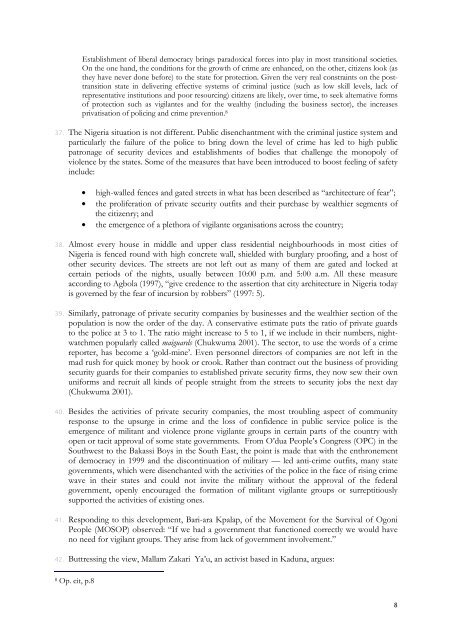114 - Nigeria - Crime and Human Rights Shettima, Kole - The ICHRP
114 - Nigeria - Crime and Human Rights Shettima, Kole - The ICHRP
114 - Nigeria - Crime and Human Rights Shettima, Kole - The ICHRP
Create successful ePaper yourself
Turn your PDF publications into a flip-book with our unique Google optimized e-Paper software.
Establishment of liberal democracy brings paradoxical forces into play in most transitional societies.<br />
On the one h<strong>and</strong>, the conditions for the growth of crime are enhanced, on the other, citizens look (as<br />
they have never done before) to the state for protection. Given the very real constraints on the posttransition<br />
state in delivering effective systems of criminal justice (such as low skill levels, lack of<br />
representative institutions <strong>and</strong> poor resourcing) citizens are likely, over time, to seek alternative forms<br />
of protection such as vigilantes <strong>and</strong> for the wealthy (including the business sector), the increases<br />
privatisation of policing <strong>and</strong> crime prevention. 8<br />
37. <strong>The</strong> <strong>Nigeria</strong> situation is not different. Public disenchantment with the criminal justice system <strong>and</strong><br />
particularly the failure of the police to bring down the level of crime has led to high public<br />
patronage of security devices <strong>and</strong> establishments of bodies that challenge the monopoly of<br />
violence by the states. Some of the measures that have been introduced to boost feeling of safety<br />
include:<br />
• high-walled fences <strong>and</strong> gated streets in what has been described as “architecture of fear”;<br />
• the proliferation of private security outfits <strong>and</strong> their purchase by wealthier segments of<br />
the citizenry; <strong>and</strong><br />
• the emergence of a plethora of vigilante organisations across the country;<br />
38. Almost every house in middle <strong>and</strong> upper class residential neighbourhoods in most cities of<br />
<strong>Nigeria</strong> is fenced round with high concrete wall, shielded with burglary proofing, <strong>and</strong> a host of<br />
other security devices. <strong>The</strong> streets are not left out as many of them are gated <strong>and</strong> locked at<br />
certain periods of the nights, usually between 10:00 p.m. <strong>and</strong> 5:00 a.m. All these measure<br />
according to Agbola (1997), “give credence to the assertion that city architecture in <strong>Nigeria</strong> today<br />
is governed by the fear of incursion by robbers” (1997: 5).<br />
39. Similarly, patronage of private security companies by businesses <strong>and</strong> the wealthier section of the<br />
population is now the order of the day. A conservative estimate puts the ratio of private guards<br />
to the police at 3 to 1. <strong>The</strong> ratio might increase to 5 to 1, if we include in their numbers, nightwatchmen<br />
popularly called maiguards (Chukwuma 2001). <strong>The</strong> sector, to use the words of a crime<br />
reporter, has become a ‘gold-mine’. Even personnel directors of companies are not left in the<br />
mad rush for quick money by hook or crook. Rather than contract out the business of providing<br />
security guards for their companies to established private security firms, they now sew their own<br />
uniforms <strong>and</strong> recruit all kinds of people straight from the streets to security jobs the next day<br />
(Chukwuma 2001).<br />
40. Besides the activities of private security companies, the most troubling aspect of community<br />
response to the upsurge in crime <strong>and</strong> the loss of confidence in public service police is the<br />
emergence of militant <strong>and</strong> violence prone vigilante groups in certain parts of the country with<br />
open or tacit approval of some state governments. From O’dua People’s Congress (OPC) in the<br />
Southwest to the Bakassi Boys in the South East, the point is made that with the enthronement<br />
of democracy in 1999 <strong>and</strong> the discontinuation of military — led anti-crime outfits, many state<br />
governments, which were disenchanted with the activities of the police in the face of rising crime<br />
wave in their states <strong>and</strong> could not invite the military without the approval of the federal<br />
government, openly encouraged the formation of militant vigilante groups or surreptitiously<br />
supported the activities of existing ones.<br />
41. Responding to this development, Bari-ara Kpalap, of the Movement for the Survival of Ogoni<br />
People (MOSOP) observed: “If we had a government that functioned correctly we would have<br />
no need for vigilant groups. <strong>The</strong>y arise from lack of government involvement.”<br />
42. Buttressing the view, Mallam Zakari Ya’u, an activist based in Kaduna, argues:<br />
8 Op. cit, p.8<br />
8
















